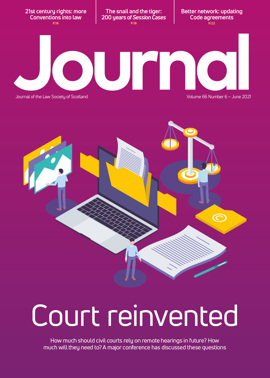Viewpoints: June 2021
Tom Quail's article “Pre-nups: questions of protection” (Journal, April 2021, 18) was opportune and interesting, but invites some comment.
What is undesirable is the current trend of supplanting the Scottish phrase “ante-nuptial contract of marriage” with the English phrase “pre-nuptial agreement”. While, of course, both phrases mean an agreement that details the parties' respective conditions for, and terms of, their intended marriage, under Scots law there is a contract, that is, an agreement enforceable, except to the extent that it is judged “not fair and reasonable at the time it was entered into” by the court, whereas under English law there is a mere agreement, unenforceable except to the extent, if any, to which it is adjudged fair and reasonable.
In this way the approaches of the Scottish and English courts are essentially antithetical. “The approach of English law to nuptial agreements differs significantly from the law of Scotland.” In England, “A court… is not obliged to give effect to” such agreements (Radmacher v Granatino [2010] UKSC 42, paras 2, 3). Incidentally, the single dissenting Justice, Lady Hale, erred in stating that “the object of an ante-nuptial agreement is to deny the economically weaker spouse the provision to which she – it is usually although by no means invariably she – would otherwise be entitled” (para 137).
When, in the 1950s, I embarked on my legal career, a disproportionate amount of my time was engaged in the drafting of ante-nuptial contracts of marriage. Since then, they may fairly be said to have fallen more or less into desuetude, and there is still relatively little demand for them.
These contracts, like so many in 19th-century Scotland when such contracts were common amongst the upper classes, were by no means confined to parties whose assets and finances were in marked imbalance. Lady Hale's understanding is also erroneous because such agreements routinely embody diverse family matters. This is why the article is wrong to confine itself to “the business owner/wealthy individual and the less wealthy other party”, and to assert that “The agreement is primarily to provide the wealthy client with protection.”
However, my principal criticism is the author's relaxed approach to the question of legal advice. I am of opinion that each party to an ante-nuptial contract of marriage must always take truly independent legal advice, and that to state that “it is only appropriate that the reasonable legal costs of the other party requiring to take independent legal advice should be met” by the “wealthy client”, is not in accordance with the spirit of “independent” legal advice.
Importantly, the article affirms that “the solicitor consulted should have a knowledge of family law matters”. Drafting an ante-nuptial contract of marriage is a complex and difficult assignment, in many cases involving the laws relating to divorce, separation, taxation, pensions, inheritance, companies, trusts, domicile, jurisdiction, and more: experto crede.
George Lawrence Allen, Edinburgh
Perspectives
Features
Briefings
- Criminal court: Doing justice with benefit fraud
- Corporate: Clarity is king – win some, lose some
- Agriculture: TFC provides holdings compliance guide
- Employment: Unintentional wrongs and injured feelings
- Sport: Where now for worker status?
- Intellectual property: IP and artificial intelligence
- Property: EWS1: another hurdle for the lawyer
- Scottish Solicitors' Discipline Tribunal
In practice
- Society's new office bearers step up
- AGM hears of a challenge met
- How do you manage the bank manager?
- Letters of engagement: one size does not fit all
- Climate change, inequality and the profession
- Fairness and justice: nice and simple does IT
- Profile: Craig Connal
- The Eternal Optimist: Difficult, or just different?
- Ask Ash: An anxious return






